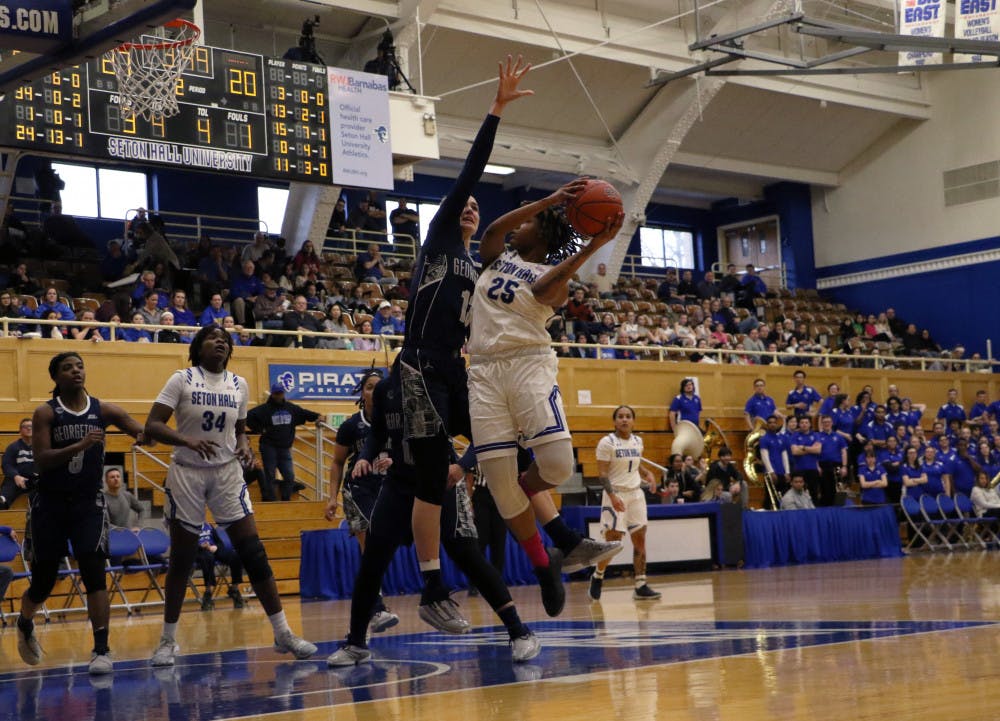The Stillman School of Business placed third in the New York Regional Final of the Global Investment Research Challenge on Feb. 17, behind the business schools of Rutgers University and Fordham University.
The final four winners were Rutgers University, Fordham University, Seton Hall University and Pace University.
The Seton Hall team consists of students, David Falk, Mary Cappelletti, Himanshu Chhabra, Shaun Maloney and Vijar Kohli competed in the intercollegiate competition among 16 colleges and universities in the New York area.
According to Tony Loviscek, Chair of the Department of Finance and team advisor, Seton Hall's team created a 30-page report on New Jersey Resources, the company assigned to all of the schools competing.
The competition consisted of two segments, one written and one oral. Teams reported a quantitative and qualitative assessment of the company.
The assignment was to determine and take a position of whether investors should buy, hold or sell the company's stock.
The teams then argued their position orally in front of a panel of Wall Street analysts, Loviscek said.
"It was thrilling to watch them in action," Dr. Joyce Strawser, Acting Dean of the Stillman School of Business, said. "The team's presentation was polished and professional, and the students delivered their recommendation with confidence."
"We declared a $50 target price for NJR and used two valuation methods to arrive at that, the Free Cash Flow to Equity and Dividend Discount Models," Kohli, a senior, said.
The combination of the team's scores on the written and oral reports qualified them for the "final four," with Seton Hall being the only school among the finalists that supported a "buy" for the stock, Loviscek said.
Chhabra said he thought his team's presentation in the finals deserved a better placement, but it seemed the judges did not agree with their recommendation for the stocks.
"Many audience members thought that we had the best presentation out of all the schools, but in the end it seemed that our ‘buy' recommendation of the stock was our Achilles heel," Chhabra said. "We still believe the company is worthy of a ‘buy' recommendation as opposed to a ‘sell' based on fundamentals and our research analysis; however, the judges thought otherwise."
Maloney said he was proud they finished third in a competition that featured 15 other area schools.
"Of course, our goal was to win but advancing past the first round of presentations is a great accomplishment," Maloney said.
Maloney also displayed good sportsmanship towards Seton Hall rival Rutgers.
"Rutgers had a very polished presentation and did not falter in the question and answer period," Maloney said. "I thought our recommendation and supporting arguments were better, but overall they were certainly deserving of the win."
Chhabra said he and his team were "honored" to have the opportunity to represent the University in the competition, as well as bring them back into the ‘Final Four.'
This was the ninth annual competition. According to Loviscek, Seton Hall has participated in it every year and won in both 2006 and 2007.
"This track record shows that Seton Hall students have a certain amount of conviction and composure that allows them to continuously outperform the average business school," Kohli said.
Maloney said overall the experience was unforgettable, allowing the team to experience a real-world application of what they learn in class.
"Further, we spent countless hours together and formed lasting friendships," Maloney said. "The experience was unlike any I have had at Seton Hall, and is certainly worth considering for students who want to take on a challenge."
Joanna Toole can be reached at joanna.toole@student.shu.edu





